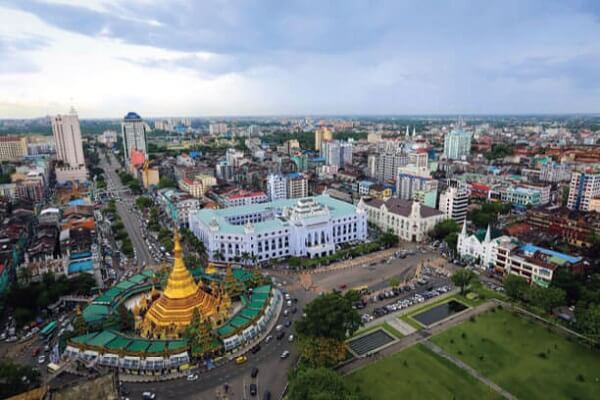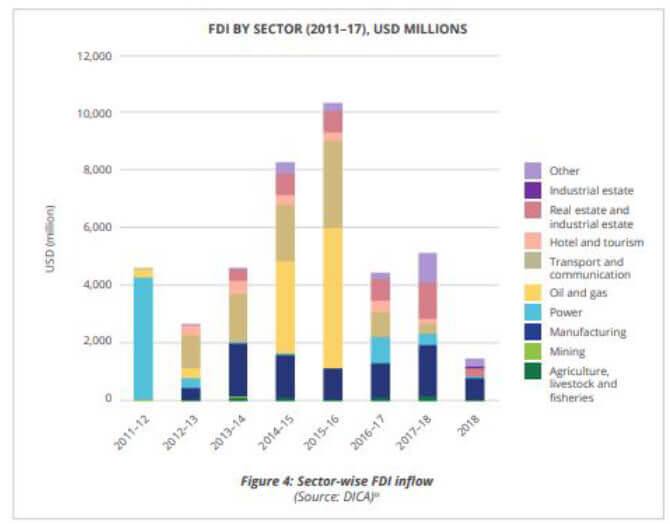
Foreign Direct Investment in Myanmar has increased manifold since the government adopted a series of political, economic, and administrative reforms in 2011. Today, many countries around the world are firming up their presence in Myanmar to benefit from the business-friendly policies that have been put in place to exploit the immense wealth of human and natural resources the country is trying to tap to drive its growth
Foreign Direct Investment (FDI) in Myanmar has grown substantially since the government adopted a series of political, economic, and administrative reforms in 2011. Successive governments have pursued market liberalisation, opening up a range of sectors to private business and foreign investment. The easing of sanctions spurred a rush of interest into the country as one of the last Asian frontier markets. According to the World Bank, the country’s GDP expanded by 6.4% in 2017–18, a figure which is projected to grow to 6.8% in 2018/19, 6.9% in 2019/20 and 7.1% in 2020–21.
In Myanmar, approved FDI varies significantly on a year-by-year basis due to major, “one-off” projects often in the energy sector. Nevertheless, FDI in Myanmar rose by 45 percent to $4.3 billion in 2017 – the third consecutive year of increase. Strong investments from ASEAN and the United States helped push the inflows. ASEAN remained the largest source of investment (48 percent), led by companies based in Singapore. Companies from the United States and the European Union were also active investors in Myanmar in 2017.

Foreign Direct Investment (FDI) is projected to increase further as the government has drafted and enforced business-friendly measures, including a new Myanmar Investment Law (MIL) that was enacted in April 2017. The law combines aspects of the previous Foreign Investment Law of 2012 (FIL) and Myanmar Citizens’ Investment Law of 2013, and is aimed partly at providing more opportunities for foreign firms. Separately, a new Myanmar Companies Law was passed in 2017 and came into effect in August 2018, replacing in part the 1914 Myanmar Companies Act. The new law aims to strengthen the Myanmar economy by creating a set of clear, transparent, and consistent regulations with improved corporate governance and accountability.
However, despite the rise in FDI into Myanmar it continues to be dominated by Greenfield activities. The low level of M&A transactions reflects the limited M&A opportunities and less mature M&A environment. Despite the government’s initiatives in fostering best business practices in the country, investors still face domestic risks. In particular, peace agreement talks with several ethnic armed groups are still ongoing, and the government has had to accommodate a range of stakeholders with diverging interests in the economy. Nonetheless, economic growth in Myanmar remains robust, offering large potential for business relationships to take place between foreign investors and local stakeholders.

FDI INFLOWS BY SECTOR
Extractive industries, manufacturing and transportation services dominate FDI in Myanmar. There is also a significant increase in investments in manufacturing activities and services (accommodation and real estate), which have further contributed to the rise of FDI in the country, according to Myanmar’s Directorate of Investment and Company Administration (DICA).
The following chart breaks down FDI by sector. The four largest sectors are: oil & gas, power, manufacturing, and transport & communication; they account for almost 82% of the total FDI inflow. Several key communications and oil and gas projects contributed to the large approval totals in 2014–15 and 2015–16.
EXTRACTIVE INDUSTRY
Some large-scale extractive FDI activities pushed up investment in this industry. A consortium led by Total (France) started the Badamyar gas production project in 2017 with partners that include Chevron-Unocal (United States), PTTEP (Thailand) and MOGE (Myanmar). Woodside (Australia) expanded its offshore activities, which resulted in three natural gas discoveries.
Ethos Energy (United States) won an $8 million contract to upgrade the Ywama power plant and Sahakol Equipment (Thailand) was awarded a contract to operate a $100 million tin mine operation. A number of significant M&A activities in mining took place in 2017. They include the acquisition by Siamgas and Petrochemicals (Thailand) of a 30 per cent interest in a 230 MW power plant for $48 million, China Polymetallic Mining (China) of Hua Xing Global (China) mining activities and NHAmudi Asset Management (Republic of Korea) of a gas upstream asset owned by Korea Gas Corporation (Republic of Korea) in the host country. In 2018, Pacific Hunt Energy (Australia) undertook drilling and exploration projects with two local companies and Total (France) started extraction of natural gas in the host country.
MANUFACTURING
FDI continued to flow to a wide range of manufacturing industries, which included food and beverage, automotive, garments and cement production. In the food and beverage industry, New Hope Liuhe (China) made a $10 million investment in 2017 for production of animal feed, Agrocorp International (Singapore) opened a rice production and export facility, Acecook (Japan) opened a $20 million noodle factory and Sahadharawat (Thailand) started to invest in a $5 million metal packaging plant in the Thilawa Special Economic Zone (SEZ). In the same year, Thai Beverage (Thailand) acquired a majority stake in a local distillery and a supply chain service company for $742 million.
In 2018, De Heus (Netherlands) opened its second feed plant in the country and Trouw Nutrition (Netherlands) opened its first manufacturing unit, with an investment of $6 million. Nestle (Switzerland) is opening a factory in the end of 2018 to serve the local market. FDI in garments continued to be dominated by Asian investors.
Also Read: India-Myanmar a progressive partnership
LS Cable & System (Republic of Korea) together with an affiliate started construction of an $18 million factory in 2017 to produce aerial cables for buildings. Komatsu (Japan) opened a plant the same year to produce equipment to support the host country’s growing infrastructure industry. In 2018, Koryo Cable (Republic of Korea) made an $8.2 million investment to build a cable manufacturing plant. Metal packaging companies Sahadharawat (Thailand) invested $5.1 million to manufacture metal cans in Myanmar and Soilbuild (Singapore) sets up a plant with an investment of $13.9 million to produce steel products.
In chemicals, BASF (Germany) opened its first manufacturing plant in Myanmar in 2018, producing construction chemicals for the domestic market, while Thailand Central Chemical (Japan–Thailand) opened a fertilizer processing plant and Jotun (Norway), a chemical company, started the construction of a factory to manufacture paint products.
In the automotive industry, Nissan (Japan) and Tan Chong (Malaysia) opened a $50 million vehicle assembly plant in 2017, and Ford (United States) together with a local partner started assembling cars in a new facility with an initial investment of $10 million.
In other products, Unilever (Netherlands) formed a joint venture with EAC (Myanmar) in 2017 to manufacture, market and distribute home and personal care products in the country. Nippon Concrete Industries (Japan) and a local partner opened a $5 million concrete manufacturing facility and Aju Group (Republic of Korea), a construction materials company, started construction of a factory.
SERVICES
Driven by an increase in both regional and global cross-border trade, logistic companies are expanding in Myanmar. In 2017, some foreign logistics companies invested or expanded their operations. They include Yusen Logistics (Japan) and CEVA Logistics (Netherlands). DHL (Germany) invested a further $114 million to expand its supply chain business, and Nittsu Logistics (Japan) completed construction of a logistics centre. Puma Energy (Singapore) opened a $92 million petroleum products storage facility and Metro Cash and Carry (Germany) entered into a joint venture with a local partner in 2017. The latter started construction of a warehouse in the Thilawa SEZ last year. In 2018, Yamato (Japan) expanded into the country through offering warehousing, cross-border transport and freight forwarding services.
With increased access to smart phones and the internet, there has also been an increase in the number of digital firms investing in the country. NTT Communications (Japan) opened its first data processing centre in the country last year and Viettel Group (Viet Nam) launched a 4G mobile network in Myanmar in 2018. Ride-hailing taxi companies such as Grab (Singapore) expanded into Myanmar.
Also Read: Travellers’ guide to fascinating Myanmar
Fintech investments such as through Ooredoo (Qatar), a mobile payment company, and National Bank of Canada acquired a 22 per cent stake in Ongo (Myanmar), a mobile money service company in 2018. Lippo Group (Indonesia) is building hospitals in Myanmar with a joint venture partner.
INFRASTRUCTURE
JFE Steel Corporation (Japan), Meranti Steel (Singapore), JFE Shoji Trade Corporation (Japan), MarubeniItochu Steel (Japan) and Hanwa (Japan), formed a joint venture and was awarded a contract in 2017 to establish a $85 million steel plant which is to be completed in 2020. In the same year, Punj Lloyd (Turkey) won a contract for the India– Myanmar–Thailand Trilateral Highway and Soilbuild Construction (Singapore) was awarded $3.9 million for civil and superstructure work.
McDermott (United States) and Baker Hughes (United States) won a contract for front-end engineering design for Posco Daewoo (Republic of Korea) offshore project in Myanmar. TTCL, a joint venture between ITD (Thailand) and Toyo Engineering Corporation (Japan), announced plans to invest over $6 billion in the next few years to establish two coalfired power plants and LS Cable & System Asia (Republic of Korea) and Gaon Cable (Republic of Korea) started investment to build a $18 million power cable plant.
The expansion of the Thilawa SEZ, which involves a consortium of Japanese investors (AIR 2017) and companies that started operations in the zone in 2017 (e.g. Nissan-Tan Chong Motor and Nippon Express), also contributed to the rise in inflows in the country.
In 2018, Myanmar Railways awarded a $2.5 billion contract to a consortium comprising Oxley Holdings (Singapore), Sino Great Wall (China) and Min Dhama (Myanmar). In the same year, Sembcorp (Singapore) started operating the country’s largest gasfired power plant ($300 million) under a 22-year build-operate-transfer agreement.
FDI BY COUNTRY OF ORIGIN
In Myanmar, ASEAN remains the largest source of investment (48 per cent), led by companies based in Singapore. Companies from the United States and the European Union were also active investors in Myanmar in 2017.
Also Read: Myanmar- The Golden Land
The total investment by EU countries in Myanmar upto April 2018 stood at $6.6 billion. There are about 300 companies from EU countries established and operating in Myanmar, according to the Business Guide 2019 by European Chamber of Commerce in Myanmar.
According to the latest data provided by DICA, country-wise break of investment data in terms of yearly approved amount of foreign investment shows that China, Singapore, Thailand, Malaysia, Korea, Japan, Hong Kong, South Korea, the UK, USA, Netherlands and Vietnam were among the largest foreign capital contributors in Myanmar.
MYANMAR ON HIGH GROWTH PATH
According to the World Bank, Myanmar is one of the fastest growing economies in the world with the country’s GDP expanding by 6.4% in 2017–18, a figure which is projected to grow to 6.8% in 2018/19, 6.9% in 2019/20 and 7.1% in 2020– 21. However, the country needs to overcome certain barriers to growth including outdated laws, limited M&A opportunities offered by the country, and domestic risks like terrorism and extremist-inspired violence, among others.
As the Government of Myanmar has committed to address these challenges at the earliest, efforts like creation of a separate Ministry of Investment and Foreign Economic Relations, peace agreement talks with several ethnic armed groups and opening up of a range of sectors to private business and foreign investment will go a long way to engender confidence in Myanmar as a place to invest in.
Be a part of Elets Collaborative Initiatives. Join Us for Upcoming Events and explore business opportunities. Like us on Facebook , connect with us on LinkedIn and follow us on Twitter, Instagram.











